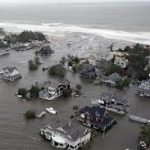Federal budget cuts disaster relief
Want help with climate disaster risks?
Congress prefers to protect us from a different hazard.
 This morning House Republicans announced their proposed 2018 budget. It calls for $200 billion in cuts.
This morning House Republicans announced their proposed 2018 budget. It calls for $200 billion in cuts.
Let’s look at two programs that have helped Americans protect against the growing costs of climate change. First, FEMA’s Disaster Relief Fund, originally created to help with needs “that overwhelm state resources,” has often been the key to local physical and economic recovery from hurricanes and floods. Under the GOP budget, FEMA relief would drop from 75-100% of costs to 25%.
Second, the Small Business Administration offers loans to get companies back on their feet quickly after a natural disaster, rebuilding damaged property and inventory. The whole community benefits since, without the loans, local businesses can remain shuttered for months or years, depressing the local economy and job market. The GOP would eliminate SBA loans altogether.
Federal aid disappearing, while disaster costs are climbing and state revenues are already under pressure. Why does the GOP wants to cut these programs? To protect us from a different hazard. They tell us that “generous federal disaster relief creates a moral hazard by discouraging businesses from purchasing insurance for natural catastrophes.”
While we’re being protected from moral hazards, who will help us with the growing physical ones? The GOP says businesses should purchase more private insurance, and state taxes should replace the missing FEMA funds. Whether we agree with this moral reasoning, we have to ask ourselves some practical questions. Do we want the recovery of commerce and jobs in our town to depend on business owners voluntarily insuring themselves against unlikely events? And will our state actually put aside the millions or billions needed to offer FEMA-like services and funds for the next disaster?
You may want to urge Congressional Republicans to reconsider their priorities.



